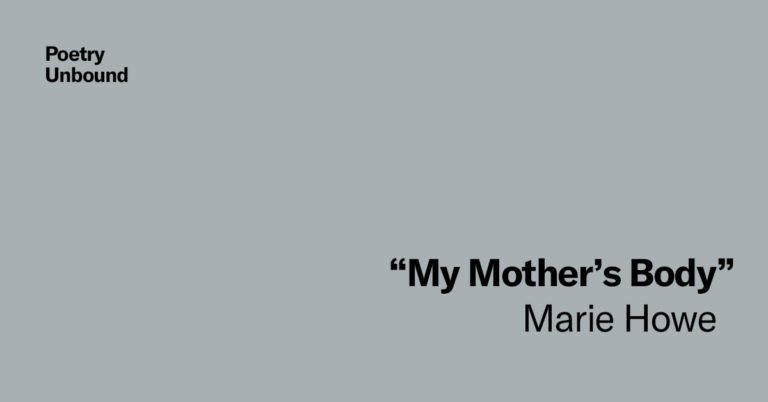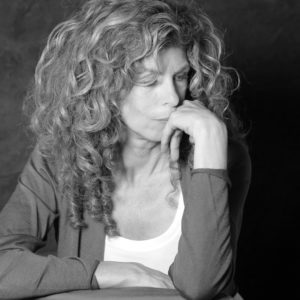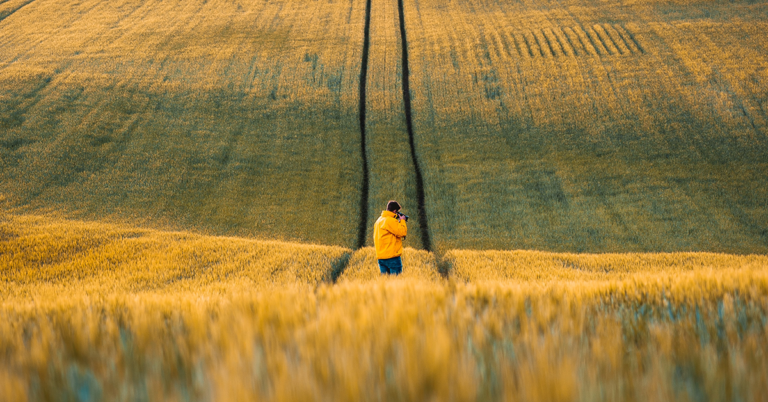Marie Howe
My Mother’s Body
Marie Howe’s poem “My Mother’s Body” is wise about age. In the poem, Marie’s mother is young enough to be Marie’s own daughter, and in this imagination there is wonder, understanding, and even forgiveness.
A question to reflect on after you listen: Are there things that you have found easier to understand — or even forgive — as you’ve gotten older?

Guest

Marie Howe is a chancellor of the Academy of American Poets. She’s published four collections of poetry: What the Living Do, The Good Thief, The Kingdom of Ordinary Time, and Magdalene. She has taught at Sarah Lawrence College, Dartmouth College, and New York University.
Transcript
Pádraig Ó Tuama, host: My name is Pádraig Ó Tuama. I’m a poet from Ireland. And poetry has been a friend for me because, when I started writing it at the age of 11, I began to realize that it could tell me things about myself that I didn’t know.
[music: “At Dusk” by Gautam Srikishan]
“My Mother’s Body” by Marie Howe:
“Bless my mother’s body, the first song of her beating
heart and her breathing, her voice, which I could dimly hear,
grew louder. From inside her body I heard almost every word she said.
Within that girl I drove to the store and back, her feet pressing
the pedals of the blue car, her voice, first gate to the cold sunny mornings,
rain, moonlight, snow fall, dogs…
Her kidneys failed, the womb where I once lived is gone.
Her young astonished body pushed me down that long corridor,
and my body hurt her, I know that – 24 years old. I’m old enough
to be that girl’s mother, to smooth her hair, to look into her exultant frightened
eyes, her bedsheets stained with chocolate, her heart in constant failure.
It’s a girl, someone must have said. She must have kissed me
with her mouth, first grief, first air,
and soon I was drinking her, first food, I was eating my mother
slumped in her wheelchair, one of my brothers pushing it,
across the snowy lawn, her eyes fixed, her face averted.
Bless this body she made, my long legs, her long arms and fingers,
our voice in my throat speaking to you now.”
The first time I read this poem, I felt like I was brought into a moment in time where time had been changed. Time had been collapsed, to go to the front and to the back of the experience of being alive. And I found myself not thinking about the poet’s mother; I found myself thinking about my own mother, who is alive, and thinking of her as a child, think of, what age was she, when I was born? How would I treat somebody now that I met, who was that age?
This poem is a carnal poem in the sense of “carnal” comes from the word “carne,” for meat. And here, we hear that line, “I was eating my mother.” This poem knows that we take from each other. And the voice of the poet grows stronger while the voice of the poet’s mother diminishes and, in the final line, is gone altogether, apart from that glorious plural pronoun of “our.” And I think the poet here is speaking about all the ways that we carry people who have tried to love us; and maybe the person succeeded, or maybe they didn’t, but nonetheless, we carry their story into our own surviving. And there must be a way that we can reckon with the “us” that we’ve been, whether that’s been an easy “us” or a difficult “us.”
Similarly, the first word in this poem, “Bless” — I think of the word “bless” as an extraordinary word of generosity. “Bless” doesn’t need God. “Bless” doesn’t need any religious system to think through. “Bless” is just a word of kindness, a word of beatitude, a word of generous enfolding, to say that “Let me wrap you in a word that is meant for pure goodness.”
The titling, too, of this poem, as well as that first line, it isn’t “my mother” — it isn’t “Bless my mother.” It’s “Bless my mother’s body.” And so, by blessing her mother’s body, she’s also blessing her own body and, perhaps, extending a kind of forgiveness to herself, also, to say, “It has taken me this long to get to where I am now; and let that be blessed.”
I’m 43 now, and when my mother was 43, I was 16. And I didn’t know how to be a 16-year-old. Nobody had taught me how to be 16. And I felt alone and filled with the melodrama of teenage years, as well as with some serious griefs. And I can now look at my mother at 43 and understand: of course, she wouldn’t have known how to mother that young person. I didn’t know how to be him, and she didn’t know how to mother him.
And at 43, were I to meet somebody who was 16, I wouldn’t know what to say to them. It would be difficult. And if there had been a long history of trying to say things that were then misinterpreted, if there had been pain, of course, it would be even more distant. A stranger could, perhaps, say things to me as a 16-year-old that my mother could never have, even if she’d tried, because I wouldn’t have let her. And so, I look to the story of my own mother’s forty-third year in a new way, through the lens of this poem.
“My Mother’s Body” by Marie Howe.
“Bless my mother’s body, the first song of her beating
heart and her breathing, her voice, which I could dimly hear,
grew louder. From inside her body I heard almost every word she said.
Within that girl I drove to the store and back, her feet pressing
the pedals of the blue car, her voice, first gate to the cold sunny mornings,
rain, moonlight, snow fall, dogs…
Her kidneys failed, the womb where I once lived is gone.
Her young astonished body pushed me down that long corridor,
and my body hurt her, I know that – 24 years old. I’m old enough
to be that girl’s mother, to smooth her hair, to look into her exultant frightened
eyes, her bedsheets stained with chocolate, her heart in constant failure.
It’s a girl, someone must have said. She must have kissed me
with her mouth, first grief, first air,
and soon I was drinking her, first food, I was eating my mother
slumped in her wheelchair, one of my brothers pushing it,
across the snowy lawn, her eyes fixed, her face averted.
Bless this body she made, my long legs, her long arms and fingers,
our voice in my throat speaking to you now.”
Lily Percy: “My Mother’s Body” comes from Marie Howe’s book The Kingdom of Ordinary Time. Thank you to W.W. Norton, who published the book and gave us permission to use Marie’s poem. Read it on our website at onbeing.org.
Poetry Unbound is Tony Liu, Chris Heagle, Kristin Lin, Erin Colasacco, Serri Graslie, Eddie Gonzalez, and me, Lily Percy. Our music is composed and provided by Gautam Srikishan. And this podcast is produced by On Being Studios, which is located on Dakota land. We also produce other podcasts you might enjoy, like On Being with Krista Tippett, Becoming Wise, and This Movie Changed Me. Find those wherever you like to listen, or visit us at onbeing.org to find out more.
Books & Music
Recommended Reading
The On Being Project is an affiliate partner of Bookshop.org and Amazon.com. Any earnings we receive through these affiliate partnerships go into directly supporting The On Being Project.











Reflections